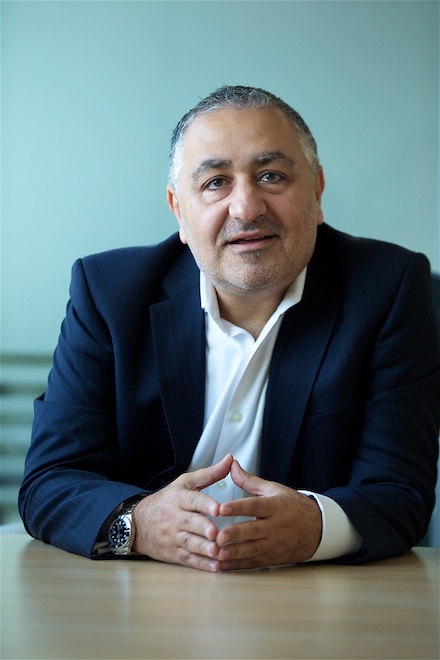Broadcasting
Digital Government Services is a Key Enabler of Socio-Economic Transformation

By: Habib Mahakian, Vice-President – Emerging Africa, Dell Technologies
In the last 12 months technology has been pivotal in connecting people with business sectors, whilst enabling the provision of essential services to local communities. As eCommerce accelerated and manufacturing altered supply chain processes – technology flourished and transformed the way people shopped, worked and received goods.

Habib Mahakian, Vice-President – Emerging Africa, Dell Technologies
These digital migrations also reached public services, with healthcare and schools going virtual, resulting in an increasing number of people making the shift to digital across many facets of everyday life. We’re now used to ordering groceries online, getting video calls from our doctors, and socialising and engaging on digital platforms.
With these changes come shifts in citizen expectations. As the private sector continues to rapidly progress and meet customer needs via a digital-first approach, it’s crucial that the public sector innovates in tandem, and delivers service provision which utilises the full potential of digitalised infrastructure.
We now stand at an exciting juncture, with the technology to turbocharge a trust-centred public service experience, and in turn, drive innovations in how we process data, deliver communications, and create efficiencies across the board.
Building interactivity into the public sector
Across Emerging Africa, both the public and private sectors are making significant investments in digital transformation, with a view to integrate digital technology into local economies, specifically in sectors such as engineering, healthcare, telecommunications and education. This highlights the appetite for digital, interactive, and collaborative services even before the onset of the pandemic.
By digitising services and making them available to users online,around the clock, governments can not only increase digitalisation to give citizens the services they need but it can do so while decreasing costs and increasing productivity,with reduced administrative burdens for providers. Beyond resources, the implementation of the public user experience is vitally important, as it impacts the uptake.This is evidenced in the growing demand of digital services across Emerging Africain segments such as eCommerce, telehealth, digital banking and more.
Digital transformation is a journey, not a destination
As the world forges a pathway towards economic recovery and governments look to build back better, unlocking the next normal of public services will depend on technology and the will to truly transform. The benefits of digitising public services are clear for both governments and their citizens. However, digitising surface-level services is not enough – this must be supported by deeper and infrastructural digital transformations to be sustainable. This means removing unnecessary processes with the design of a digital strategy that considers citizen, and workforce experience, as well as cost savings.
From challenges in regulatory policies to lack of infrastructure and access to connectivity – there are still cities and countries in Emerging Africa that are more complex that we usually imagine.
For instance, access to reliable and high-quality bandwidth is a critical factor in bringing the benefits of technology to businesses and therefore investment in telecommunications infrastructure is key to becoming a digitally enabled economy. The continent’s growing populations and lack of legacy technology infrastructure can be turned to an advantage if countries adopt new technologies straight away and use them to leapfrog into the 21st century.
According to the International Monetary Fund, the digital economy already accounts for more than 5% of gross domestic product (GDP) in some African nations. This could be more than doubled to 12-20% if countries harness the economic potential of digital technology.
Therefore, what organizations and governments need to understand is that digital transformation is not a destination, but a never-ending journey. With the right infrastructure, policies and connectivity in place, businesses can expand, jobs can be created, and economic diversification will accelerate – promoting growth, inclusion and improving citizen experiences.
Collaborating for success
Collaboration is reliant on equity when it comes to connectivity – which must be addressed as a key part of any digital transformation. By partnering with IT and Telecom companies, governments can boost connectivity, and extend the availability of services for all.
There is much to be gained through the digitisation of government services and we are at a unique crossroads, with ample opportunity for transformation. Governments now can build back better services, boost resilience, and enhance relations with citizens, with technology the all-important bridge. Prioritising the digitisation of government services is akin to prioritising the citizens they serve and enabling the next era of technology led, human progress.
Broadcasting
QNET Reaffirms Integrity: Dissociates from Mighty Infinity Millionaire Ltd in Nigeria

QNET, a global leader in direct selling focused on wellness and lifestyle products, firmly disassociates itself from any unlawful activities being conducted by unauthorized individuals or entities fraudulently using the QNET name to mislead and exploit members of the Nigerian public.

These concerns have resurfaced following the arrests of several suspects in Niger State and the Federal Capital Territory, Abuja.
QNET commends the Economic and Financial Crimes Commission (EFCC) for its actions in apprehending those responsible and is actively supporting the authorities to prevent further misuse of its brand.
QNET Says NO to Brand Misuse and Criminal Misrepresentation
QNET is a 27-year-old international direct selling company offering wellness and lifestyle products through a network of independent distributors.
These individuals are customers who have purchased QNET products and have chosen to build their own direct selling business using our platform. They operate independently and are not employees of QNET.
Unfortunately, certain third-party entities such as Mighty Infinity Millionaire Ltd, that have no affiliation to QNET, and operate without our oversight or recognition, have grossly misrepresented the QNET business model and acted in a manner that is in no way a representation of QNET business ethics or values.
We unequivocally state that such entities and individuals are not affiliated with or endorsed by QNET. QNET reiterates that Transblue Nigeria Limited remains our sole partner in Nigeria.
Operating Within Legal and Ethical Boundaries
In Nigeria, QNET operates strictly within the legal and regulatory frameworks through our official local partner, Transblue Nigeria Limited. We remain committed to ethical business practices and protecting both our brand and the public from exploitation. We urge members of the public to remain vigilant, verify the authenticity of individuals or entities claiming affiliation with QNET, and report any suspicious activity to the appropriate authorities.
Statement from QNET’s Regional Leadership & Legal Nigerian Partner
Responding to the fraudulent activities being perpetrated in QNET’s name, Biram Fall, Regional General Manager of QNET for Sub-Saharan Africa, states, “We are extremely disturbed by the way unscrupulous individuals have misused the QNET brand to deceive innocent Nigerians with false promises. At QNET, our values are rooted in honesty and empowering people to build better lives through genuine means. We remain committed to supporting law enforcement agencies in their efforts to bring these fraudsters to justice and encourage the public to verify any claims of affiliation with QNET before getting involved.”
To avoid further confusion, QNET wishes to emphasize the following:
● QNET does not operate or endorse any physical or online university under the name “Q-University” in Nigeria. QNET is part of a larger business conglomerate that operates the Quest International University in Malaysia, which does not have any overseas campus.
● QNET is not involved with online medical courses or academic institutions in Nigeria.
● QNET does not support or condone recruitment-driven models that promise employment, scholarships, or guaranteed returns unrelated to the legitimate sale or purchase of QNET products.
● QNET strongly condemns the unauthorized use of our intellectual property – including company logos, founder portraits, and promotional materials – by fraudulent actors aiming to mislead the public.
QNET’s Awareness Creation and Consumer Protection Efforts
Since entering the Nigerian market in 2022, QNET with the support of our local partner, Transblue Nigeria Limited, have prioritized financial literacy and consumer protection. In November 2023, we launched the Say NO! Awareness Campaign to educate the public about scams and promote responsible entrepreneurship. The campaign has reached thousands through multilingual billboards, radio messages, educational pamphlets, and online platforms. As part of this campaign, the Federal Ministry of Labour and Employment (FMLE) and the Lagos State Consumer Protection Agency (LASCOPA) were also engaged.
Cooperation with Law Enforcement
QNET expresses its full support and appreciation for the EFCC’s efforts to protect citizens and crack down on cyber and financial crimes. We are actively cooperating with the Commission in its investigations and are committed to further educating the public on the nature and values of QNET’s legitimate operations.
Public Advisory: How to Stay Safe
To protect yourself from scams falsely linked to QNET:
● Verify all QNET-related information at: www.qnet.net
● Report suspicious activity via email: network.integrity@qnet.net or WhatsApp: +233 256 630 005
● Learn how to identify scams at: www.saynocampaign.org
QNET remains fully committed to ethical business practices and transparency. We stand with Nigerian authorities in protecting citizens from fraud and will continue to cooperate fully to bring those misusing our brand to justice.
Broadcasting
Eedris Abdulkareem Teases New Protest Anthem following NBC Ban

Eedris Abdulkareem, veteran hip hop artiste, is showing no signs of backing down as he hints at releasing another protest song, shortly after his last track was banned by the National Broadcasting Commission (NBC).

Eedris Abdulkareem, veteran hip hop artiste
He recently again stirred the political waters as he hinted at the release of a new protest song, only weeks after his controversial track Tell Your Papa was banned by the National Broadcasting Commission.
The outspoken musician took to social media on Wednesday, April 16, 2025, to share an animated cover design with the words “3 Arms of Government,” suggesting the theme of his upcoming release.
Though the title remains undisclosed, the post was captioned simply with “Stay tuned,” fueling speculation that another hard-hitting social commentary is on the way.
Abdulkareem, known for his unapologetic political views, recently described the NBC’s decision to ban Tell Your Papa as hypocritical. Undeterred by censorship, he appears set to continue using music as a platform to criticize injustice and demand accountability.
The rapper also recently reaffirmed the relevance of his classic hit Jaga Jaga, stating that it would remain the country’s “second unofficial national anthem” until key issues like security, electricity, and governance are addressed.
With another protest song on the horizon, fans and critics alike are bracing for what may be Eedris Abdulkareem’s most direct political message yet.
Broadcasting
MultiChoice Brings Easter Home with Dedicated Pop-Up Channel

In celebration of the Easter season, MultiChoice has announced the launch of a dedicated Easter Pop-Up Channel, offering DStv and GOtv subscribers across Nigeria the chance to experience live broadcasts of key Easter events and services from the Catholic Archdiocese of Lagos.

The special channel, which runs from Thursday, April 17 to Monday, April 21, will be available on DStv channel 196 and GOtv channel 28, bringing the significance and beauty of Easter directly into viewers’ homes.
Throughout the Easter period, the channel will broadcast a rich lineup of live religious events. The programming begins on Thursday, April 17, with the Chrism Mass in the morning, followed by the Mass of the Last Supper in the evening.
On Good Friday, April 18, viewers can join in the Good Friday Tenebrae and the Seven Last Words service, followed by the Stations of the Cross from St. Gregory’s, and later the Passion Service.
The spiritual journey continues on Saturday, April 19, with the Easter Vigil Mass late in the evening, leading into the Easter Sunday Mass on April 20. The channel’s special programming concludes on Monday, April 21, with the Easter Monday Mass from Galilee.
This dedicated pop-up channel is designed for those who may be unable to attend church services in person, as well as for anyone seeking to deepen their spiritual observance during the Easter holidays. By broadcasting these significant events, MultiChoice reaffirms its commitment to providing content that resonates with the cultural and religious values of its viewers.
Subscribers are encouraged to tune in to DStv channel 196 and GOtv channel 28 throughout the Easter period to take part in these important religious celebrations from the comfort of their homes.

 E-Business1 day ago
E-Business1 day agoALX Nigeria Launches 2025 Ventures Incubator, Premieres Pan-African “Do Hard Things” Finale

 E-Financial1 day ago
E-Financial1 day agoInsurance Bill Seeks Compensation for Customers of Failed Firms

 E-Financial2 days ago
E-Financial2 days agoUnion Bank’s Edu360 Initiative Scores Big for Nigerian Football Development

 E-Financial1 day ago
E-Financial1 day agoSANEF’s Uche Uzoebo Highlights AI as Next Frontier in Advancement of Financial Inclusion

 E-Financial1 day ago
E-Financial1 day agoFintechs Add $18m to New Tax Initiative

 E-Financial1 day ago
E-Financial1 day agoCBN Puts Accumulated Savings, Liquid Assets by Nigerians at N75.65trn

 General News2 days ago
General News2 days agoMTN Go Make A Difference Campaign Heads to Kano, Celebrating Culture and Community Impact

 Telecom2 days ago
Telecom2 days agoEU Fines Apple and Meta €700m in Landmark Digital Markets Act Enforcement



























